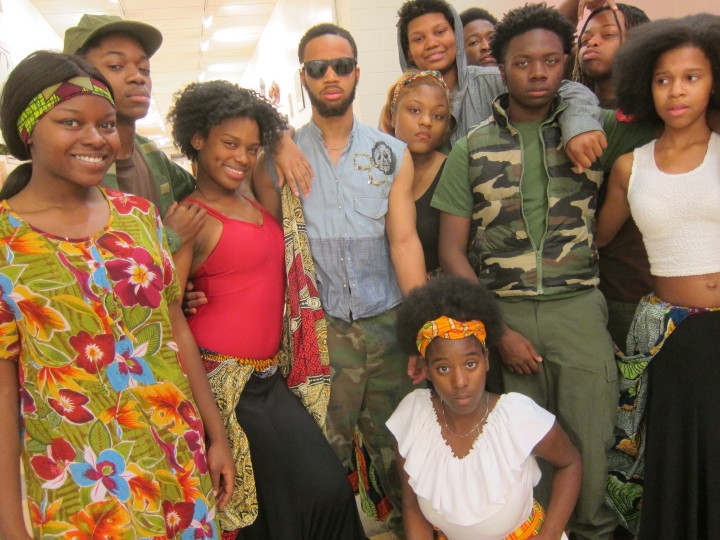
Allan Appel Photo
Senior Rashae Reeves as Mama Nadi.
A girl has been sexually mutilated by a soldier’s bayonet and has a malodorous fistula. She can’t work as a prostitute and must sing for her survival.
Think a play with such a subject does not belong in a high school production? Think again.
This weekend Ruined, Lynn Nottage’s 2009 Pulitzer Prize-winning play about gender violence and sexual trafficking during the Congolese civil war of the late 1990s, goes up as the all-school fall production at Co-Op Arts and Humanities High School.

The new arts director at Co-Op, Timothy Jones — himself a 2008 graduate of the school — wanted to challenge his kids with more social-justice oriented plays and with subjects the 75-percent female population of the arts school can connect to.
Ruined fills that bill and then some, and the students and their parents have more than gone along, although it’s the first all-school play with a warning on the poster: for mature audiences.
The remaining shows are Friday and Saturday at 2:30 p.m. and 6:30 p.m., with a portion of the modest entry fees at the school’s black box theater — $5 for students and $7 for adults — being contributed to Love146 and IRIS, two local organizations that deal respectively with sexual trafficking and helping immigrants in New Haven.

Mama inspects the “ruined” girl Sophie, played by senior Tyra DeBoise.
Tyra Deboise, who plays the “ruined” Sophie, said that she had been aware that at other times and other places, “men treated women like meat, not as if they were people and precious.” Her involvement with the play taught her that those conditions still existed.
Her under-study Tierra Williams-Ranciato — who, like Deboise, is a choir student, as the role of Sophie calls for singing four songs in the production — said she’d been aware that such things happened also. But being in the play was a kind of wake up call, a “shock” that she hoped might similarly wake up audiences who come to see the production.
The kids are not the only ones who were challenged.

Love 146’s Josh Mamis and Director McAfee.
McAfee said it’s the most difficult show he’s helmed with the kids. He has a daughter of his own, and reading of the trafficking and brutal gender violence made him “walk away from the research,” he said, to catch his breath at how violent it was during the civil war in the Ituri rain forest of Northeast Congo, where Nottage went to interview survivors for the play’s material.
“It’s more than sex, it’s genital mutilation. You have to teach the kids to be in character. How do you talk to kids about fistulas and gang rape?” he said.
The answer was, first, to send out a three-page letter to parents. Jones and McAfee then convened a meeting of parents so that everyone was on board.
Then, representatives from Love146 talked to the students, as did a local judge who presides in sexual trafficking cases.
“With this show I didn’t want them [the student actors and crew, numbering in total 40 students], to think these people are far away in the Congo. We deal with all these [issues] in school. It hits a lot close to home,” McAfee said, as he readied the students for the first show before an audience.

Some of the cast before the first performance.
Right before that happened, the students showed they were really prepared in some of their comments to panel members from IRIS, Love146, Collective Consciousness Theater, and Long Wharf Theater, who had come by to compliment them about the courage and relevance of their work.
Rashae Reeves, who plays the central role of Mama Nadi, the bordello keeper, said she was initially scared to play such a complex role, but she has nailed it in her understanding that Mama, as she put it, is “very maternal, but also a pure businesswoman.”
Josh Mamis from Love146 echoed that understanding that in the world of trafficking, even close to home, the players are not all evil; it’s not all black and white. “You can’t look at these people simply,” he said.
Another point the panelists wanted to make was made even better by creative writing junior Lauryn Darden, who plays Selima, the prostitute whom Mama Nadi details to clean up Sophie after she is sold to the house in the beginning scenes of the play.
“There are moments in the play of great subtlety. You’ve got to catch them. It’s sad but it’s not always sad. They find a way,” she said.
The boys who play the soldiers and miners patronizing the girls have perhaps the toughest transformations. As sophomore Shalont Dixon put it: “The men are animals. It’s hard for us [to be in their character],” he said.
But Tymothee Harrell, the junior who plays Commander Osembenga, caught an insight that he credited the director with helping him realize: “The hardest thing getting the role is understanding the mental imbalance in one relationship to another. Mr. Mac showed us when the men do this to women, they are dead inside already. It was done to them,” he said.

Shalont Dixon speaking to the panel.
As W.H. Auden put it in his famous poem, “September 1, 1939,” “Those to whom evil is done do evil in return.”
This tough, bracing, and ultimately hopeful production is very much worth a trip this weekend.
Ruined plays Friday and Saturday at 2:30 p.m. and 6:30 p.m. at the Black Box Theater at Co-Op High School, 177 College St. Tickets are $5 for students at $7 for adults. They can be purchased at the door. Reservations are also being accepted by contacting Kjerstin.Pugh@new-haven.k12.ct.us.